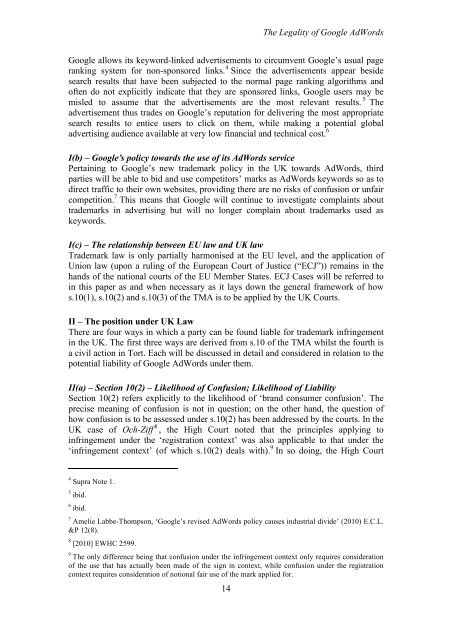Open UKLSR Volume 1(2) - Uklsa
Open UKLSR Volume 1(2) - Uklsa
Open UKLSR Volume 1(2) - Uklsa
Create successful ePaper yourself
Turn your PDF publications into a flip-book with our unique Google optimized e-Paper software.
14<br />
The Legality of Google AdWords<br />
Google allows its keyword-linked advertisements to circumvent Google’s usual page<br />
ranking system for non-sponsored links. 4 Since the advertisements appear beside<br />
search results that have been subjected to the normal page ranking algorithms and<br />
often do not explicitly indicate that they are sponsored links, Google users may be<br />
misled to assume that the advertisements are the most relevant results. 5 The<br />
advertisement thus trades on Google’s reputation for delivering the most appropriate<br />
search results to entice users to click on them, while making a potential global<br />
advertising audience available at very low financial and technical cost. 6<br />
I(b) – Google’s policy towards the use of its AdWords service<br />
Pertaining to Google’s new trademark policy in the UK towards AdWords, third<br />
parties will be able to bid and use competitors’ marks as AdWords keywords so as to<br />
direct traffic to their own websites, providing there are no risks of confusion or unfair<br />
competition. 7 This means that Google will continue to investigate complaints about<br />
trademarks in advertising but will no longer complain about trademarks used as<br />
keywords.<br />
I(c) – The relationship between EU law and UK law<br />
Trademark law is only partially harmonised at the EU level, and the application of<br />
Union law (upon a ruling of the European Court of Justice (“ECJ”)) remains in the<br />
hands of the national courts of the EU Member States. ECJ Cases will be referred to<br />
in this paper as and when necessary as it lays down the general framework of how<br />
s.10(1), s.10(2) and s.10(3) of the TMA is to be applied by the UK Courts.<br />
II – The position under UK Law<br />
There are four ways in which a party can be found liable for trademark infringement<br />
in the UK. The first three ways are derived from s.10 of the TMA whilst the fourth is<br />
a civil action in Tort. Each will be discussed in detail and considered in relation to the<br />
potential liability of Google AdWords under them.<br />
II(a) – Section 10(2) – Likelihood of Confusion; Likelihood of Liability<br />
Section 10(2) refers explicitly to the likelihood of ‘brand consumer confusion’. The<br />
precise meaning of confusion is not in question; on the other hand, the question of<br />
how confusion is to be assessed under s.10(2) has been addressed by the courts. In the<br />
UK case of Och-Ziff 8 , the High Court noted that the principles applying to<br />
infringement under the ‘registration context’ was also applicable to that under the<br />
‘infringement context’ (of which s.10(2) deals with). 9 In so doing, the High Court<br />
4 Supra Note 1.<br />
5 ibid.<br />
6 ibid.<br />
7 Amelie Labbe-Thompson, ‘Google’s revised AdWords policy causes industrial divide’ (2010) E.C.L.<br />
&P 12(8).<br />
8 [2010] EWHC 2599.<br />
9 The only difference being that confusion under the infringement context only requires consideration<br />
of the use that has actually been made of the sign in context, while confusion under the registration<br />
context requires consideration of notional fair use of the mark applied for.


